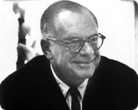Bennett Cerf, eminent publisher and punster, was a founder and chairman of Random House Books, a writer and editor of many humor books, and a popular panelist on television's long-running game show, What's My Line?
A third generation New Yorker, Cerf was born in 1898, growing up with friends such as Broadway composer Richard Rodgers and Donald Klopfer, Cerf's future business partner. Cerf received a journalism degree from Columbia University in 1920 and went on to write for the New York Herald Tribune and for a Wall Street brokerage firm. In 1925, Cerf and Klopfer purchased The Modern Library, which, two years later, led to a new company, Random House (so-named, Cerf remembered, because "we just said we were going to publish a few books on the side at random").
Among his famous literary coups was his 1934 victory against censorship, when Random House became the first to publish James Joyce's unabridged Ulysses in the United States. He also published Ayn Rand's controversial novels. Cerf maintained close personal ties to some of the high-profile authors whose work he published, such as William Faulkner, James Michener, Truman Capote, Eugene O'Neill, and Theodor Geisel (aka Dr. Seuss). In 1960, Cerf blazed new ground by acquiring his friend Alfred A. Knopf's publishing house in one of the first of the industry's mergers. Beginning during the Second World War, Cerf began to compile books of jokes, limericks, puns, and riddles. Among a host of humorous volumes is his Book of Riddles, still a children's favorite. In 1977, his memoir, At Random, was published posthumously.
Cerf's reputation as a nimble-witted gentleman-about-town was reinforced by his tenure on What's My Line? Cerf served as a panelist on the stylish (the men wore black tie) quiz show from 1951 until its demise in 1967. He also hosted the Miss America pageant for many years.
He was married to actress Sylvia Sidney briefly in the thirties, and in 1940 to Phyllis Fraser, with whom he had two sons, Christopher and Jonathan. Bennett Cerf recorded an extensive interview with the Columbia University Oral History Office in 1968, three years before his death. The oral history office also houses interviews with Phyllis Cerf Wagner (after Cerf's death, she married former New York mayor Robert Wagner) and Donald Klopfer.















